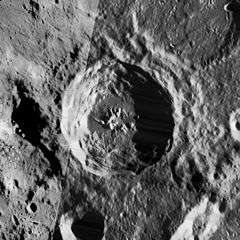Zucchius (crater)
|
Mosaic of Lunar Orbiter 4 images | |
| Coordinates | 61°24′S 50°18′W / 61.4°S 50.3°WCoordinates: 61°24′S 50°18′W / 61.4°S 50.3°W |
|---|---|
| Diameter | 64 km |
| Depth | 3.2 km |
| Colongitude | 52° at sunrise |
| Eponym | Niccolò Zucchi |
Zucchius is a prominent lunar impact crater located near the southwestern limb. Because of its location the crater appears oblong-shaped due to foreshortening. It lies just to the south-southwest of the crater Segner, and northeast of the much larger walled plain Bailly. To the southeast is Bettinus, a formation only slightly larger than Zucchius.
The crater rim is symmetrical and shows little significant wear from impacts. The inner wall is terraced, and there is a group of small central peaks that forms a curving arc around the middle of the floor. Due to its ray system, Zucchius is mapped as part of the Copernican System.[1]
To the northeast of Zucchius is the Schiller-Zucchius Basin, a Pre-Nectarian basin (multi-ringed impact structure).[2] This basin has received the unofficial designation 'Schiller Annular Plain' among lunar observers.
Satellite craters
By convention these features are identified on lunar maps by placing the letter on the side of the crater midpoint that is closest to Zucchius.
| Zucchius | Latitude | Longitude | Diameter |
|---|---|---|---|
| A | 61.8° S | 56.0° W | 28 km |
| B | 61.8° S | 54.3° W | 25 km |
| C | 60.8° S | 45.2° W | 22 km |
| D | 61.4° S | 58.7° W | 26 km |
| E | 61.3° S | 60.6° W | 21 km |
| F | 60.1° S | 56.5° W | 8 km |
| G | 60.5° S | 57.2° W | 25 km |
| H | 61.0° S | 59.7° W | 14 km |
| K | 64.3° S | 58.0° W | 10 km |
References
- ↑ The geologic history of the Moon, 1987, Wilhelms, Don E.; with sections by McCauley, John F.; Trask, Newell J. USGS Professional Paper: 1348. Plate 11: Copernican System (online)
- ↑ The geologic history of the Moon, 1987, Wilhelms, Don E.; with sections by McCauley, John F.; Trask, Newell J. USGS Professional Paper: 1348, Chapter 8. (online)
- Andersson, L. E.; Whitaker, E. A. (1982). NASA Catalogue of Lunar Nomenclature. NASA RP-1097.
- Blue, Jennifer (25 July 2007). "Gazetteer of Planetary Nomenclature". USGS. Retrieved 2007-08-05.
- Bussey, B.; Spudis, P. (2004). The Clementine Atlas of the Moon. New York: Cambridge University Press. ISBN 978-0-521-81528-4.
- Cocks, Elijah E.; Cocks, Josiah C. (1995). Who's Who on the Moon: A Biographical Dictionary of Lunar Nomenclature. Tudor Publishers. ISBN 978-0-936389-27-1.
- McDowell, Jonathan (15 July 2007). "Lunar Nomenclature". Jonathan's Space Report. Retrieved 2007-10-24.
- Menzel, D. H.; Minnaert, M.; Levin, B.; Dollfus, A.; Bell, B. (1971). "Report on Lunar Nomenclature by the Working Group of Commission 17 of the IAU". Space Science Reviews. 12 (2): 136–186. Bibcode:1971SSRv...12..136M. doi:10.1007/BF00171763.
- Moore, Patrick (2001). On the Moon. Sterling Publishing Co. ISBN 978-0-304-35469-6.
- Price, Fred W. (1988). The Moon Observer's Handbook. Cambridge University Press. ISBN 978-0-521-33500-3.
- Rükl, Antonín (1990). Atlas of the Moon. Kalmbach Books. ISBN 978-0-913135-17-4.
- Webb, Rev. T. W. (1962). Celestial Objects for Common Telescopes (6th revised ed.). Dover. ISBN 978-0-486-20917-3.
- Whitaker, Ewen A. (1999). Mapping and Naming the Moon. Cambridge University Press. ISBN 978-0-521-62248-6.
- Wlasuk, Peter T. (2000). Observing the Moon. Springer. ISBN 978-1-85233-193-1.
External links
- Jean-Luc Josset & Bernard H. Foing (1 June 2006). "SMART-1 close-up on Zucchius crater’s central peaks". European Space Agency. Retrieved 16 June 2006.
